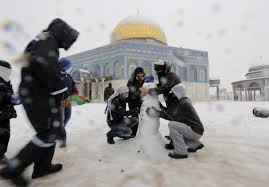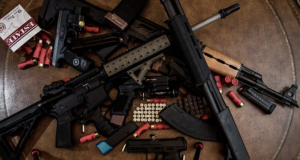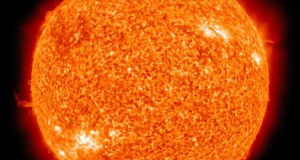
East Jerusalem residents attempt to build a Qassam rocket out of snow, to direct at Jews praying nearby.
Sheikh Jarrah Quarter, Jerusalem (AP) – Fuad Abu Hamed, 46, got through the biggest snowstorm in the Levant in a generation by huddling together with his family through power outages in the bitter cold by telling himself the Jewish authorities would surely send along some crews to clear major arteries and fix hazards created by the record snow accumulation, at which point he and his fellow East Jerusalemites could throw stones and bricks at them. But the Jerusalem municipality concentrated its limited resources on plowing and removing downed trees from the much more heavily trafficked roads of the western part of the city, depriving Hamed and his neighbors of the pleasure.
Various news outlets have characterized the Wednesday-Saturday weather system that came south from Siberia variously as the biggest snowstorm since the 1960’s, the 1950’s, or the early years of the twentieth century. It brought snow to the Gaza Strip for the first time in more than twenty years, and to Egypt – notably the Giza pyramid region – for the first time in more than a hundred. But the novelty of the experience dissolved quickly, as the weight of the snow has created hazards and deprived residents of basic services for the last week. While Arab political figures raced to blame Israel directly for causing the bad weather, locals preferred to direct actual physical violence at individual Israelis, but were stymied.
Hamed and his neighbors looked forward to a new opportunity to demonstrate their objections to Israeli sovereignty in the eastern part of the city, which Israel captured from Jordan in 1967. But the sheer fierceness of the storm not only forced the ill-prepared Jerusalem municipality and the Israel Electric Company to send its beleaguered crews and equipment elsewhere at first, it also made access to the stones, bricks, and other ready projectiles exceedingly difficult. The few electricians that did venture into East Jerusalem found themselves relatively unimpeded in their work, aside from sporadic snowballs. He vowed to try again with boulders once the snow clears.
The dearth of Jews at whom to direct dangerous thrown objects has frustrated Hamed and his friends, who revel in protesting to the world that Israel discriminates against them in the provision of basic services, all the while harassing and attacking the people that Israel does send to provide those services. “We’ve had to make do with trying to roll snowballs down the hill at soldiers manning the [Qalandia] check point,” he lamented, “but the snowballs never made it halfway down.”



